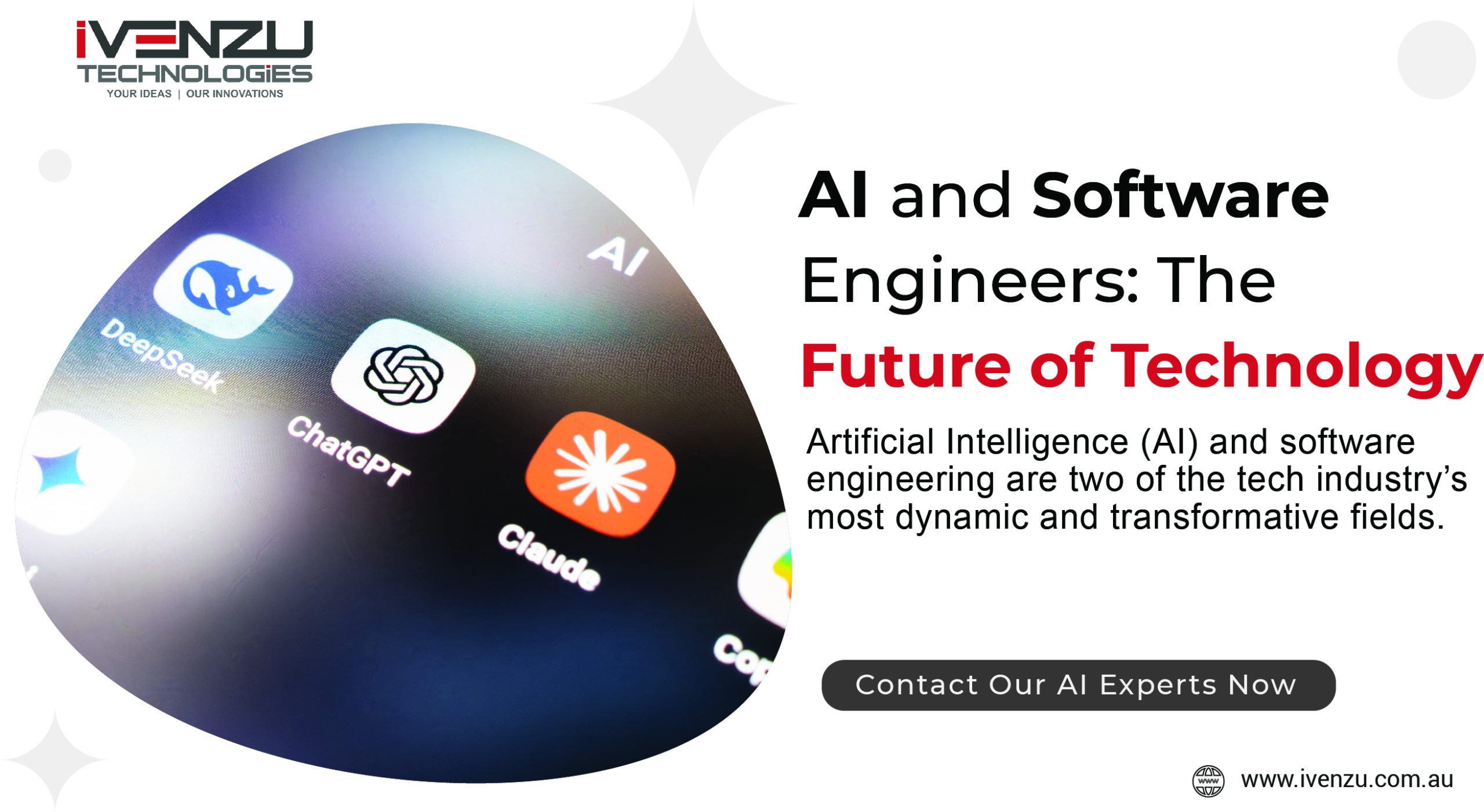AI and Software Engineers: The Future of Technology
Artificial Intelligence (AI) and software engineering are two of the tech industry’s most dynamic and transformative fields. As AI continues to evolve, software engineers are at the forefront of integrating AI technologies into applications, systems, and products. The intersection of AI and software engineering has the potential to redefine how we approach problem-solving, automation, and innovation in various industries.

In this article, we will explore the relationship between AI and software engineers, the role of AI in software development, and how the future of this collaboration can shape the technology landscape.
What is AI in the Context of Software Engineering?
AI in software engineering refers to the integration of machine learning (ML), deep learning (DL), natural language processing (NLP), computer vision, and other AI technologies into software development processes and applications. These technologies enable software to learn from data, make decisions, adapt over time, and automate tasks that traditionally require human intervention.
Software engineers use AI to enhance the functionality, performance, and efficiency of software systems, and AI can be applied to nearly every aspect of software development, from design to deployment.
The Role of Software Engineers in AI Development
Software engineers play a critical role in developing AI-driven applications. Their responsibilities can range from designing the architecture of AI systems to training machine learning models and ensuring the integration of AI technologies into software products.
Here’s a breakdown of key roles that software engineers take on when working with AI:
1. Developing AI Algorithms and Models:
-
- Software engineers with knowledge of AI and machine learning (ML) are responsible for designing and building algorithms that can learn from data. They apply various ML techniques like supervised learning, unsupervised learning, reinforcement learning, and neural networks to create predictive models.
2. Data Preprocessing and Feature Engineering:
-
- AI systems rely heavily on data, and software engineers often work on preprocessing data for training purposes. This involves cleaning, normalizing, and transforming raw data into a usable format. Feature engineering, or selecting the most relevant data features, is also crucial in building accurate models.
3. Integrating AI into Software Applications:
-
- After AI models are trained and fine-tuned, software engineers integrate these models into software products. Whether it’s a web application, a mobile app, or an enterprise system, engineers ensure that AI capabilities are seamlessly incorporated into the end-user experience.
4. AI Model Optimization and Scaling:
-
- Software engineers work on optimizing AI models to run efficiently on various hardware and scale effectively for large datasets or real-time performance. This includes optimizing algorithms, reducing computational costs, and ensuring models are scalable.
5. Deployment and Monitoring of AI Systems:
-
- Software engineers manage the deployment process once AI models are developed and integrated. This includes setting up cloud infrastructure, deploying models to production environments, and continuously monitoring the performance of AI systems. They ensure that models remain accurate and efficient over time.
How AI is Transforming Software Engineering
AI is reshaping the software development lifecycle in profound ways. Here’s how:
1. Automating Repetitive Tasks
AI can automate several aspects of software development, saving time and reducing human error. Some common areas where AI is being applied include:
-
- Code Generation: Tools like GitHub Copilot use AI to suggest code completions and snippets, helping developers write code more quickly.
- Bug Detection: AI can analyze code for potential bugs, security vulnerabilities, and performance issues, making the debugging process more efficient.
- Test Automation: AI-driven test tools can automatically generate and execute test cases, ensuring software is tested thoroughly without manual intervention.
2. Improved Code Quality and Maintenance
AI can help improve the overall quality of software through the following mechanisms:
-
- Predictive Maintenance: AI systems can predict when a piece of software or hardware is likely to fail, enabling proactive maintenance and reducing downtime.
- Code Review Assistance: AI tools can automatically review code for quality, style violations, and possible improvements, assisting developers in writing cleaner and more maintainable code.
3. Enhancing Software Design
AI can assist in the design phase of software development by analyzing user behaviour and providing insights into the most effective design choices. AI-powered design tools can help software engineers create more user-friendly and personalized applications by suggesting UI/UX improvements based on user data.
4. Faster Decision-Making with AI-Powered Analytics
Software engineers use AI to process large datasets and extract valuable insights that inform decision-making. For instance, engineers can use AI to analyze system performance, identify trends, and optimize software designs in real time.
5. AI-Driven Software Development Tools
There are now AI-driven tools available that improve the development process, including:
-
- AI-powered code editors: IDEs (Integrated Development Environments) that use AI to suggest improvements and help developers write code more efficiently.
- AI-based testing platforms: These tools automate the testing process by predicting edge cases and generating testing scenarios based on code analysis.
- AI for version control: AI tools that track code changes, understand dependencies, and assist in managing multiple project versions with minimal human effort.
Skills Required for Software Engineers Working with AI
As AI becomes more integrated into software development, software engineers must acquire specific skills to work with AI technologies effectively:
1. Programming Languages:
-
- Proficiency in programming languages such as Python, Java, and C++ is essential, as they are widely used in AI development.
2. Machine Learning and Deep Learning:
-
- Knowledge of machine learning frameworks (e.g., TensorFlow, PyTorch, Keras) and deep learning techniques like neural networks are crucial for building AI models.
3. Mathematics and Statistics:
-
- A strong foundation in linear algebra, calculus, probability, and statistics is essential for understanding how AI algorithms work and for fine-tuning models.
4. Data Science:
-
- Familiarity with data science concepts, including data preprocessing, feature engineering, and model evaluation, is critical for developing effective AI systems.
5. Cloud Computing and Big Data Technologies:
-
- Cloud platforms like AWS, Google Cloud, and Microsoft Azure are commonly used in AI development. Software engineers should also be familiar with big data technologies like Hadoop and Spark to handle large datasets.
6. Problem-Solving and Critical Thinking:
-
- Software engineers working with AI must possess strong analytical skills to solve complex problems, optimize algorithms, and refine AI models.
The Future of AI and Software Engineering
As AI advances, the role of software engineers will become even more crucial. The future of AI and software engineering promises:
-
- More AI-Assisted Development: Software engineers will increasingly rely on AI to assist in everything from code generation to bug fixing, making the development process faster and more efficient.
- Improved AI Systems: Software engineers will continue to develop more sophisticated AI algorithms capable of solving even more complex problems.
- Collaboration with Other Technologies: AI will work in tandem with other emerging technologies, like blockchain, IoT, and 5G, to create new opportunities for innovation in software development.
The Symbiotic Relationship Between AI and Software Engineers
The integration of AI into software engineering has already begun to transform how software is developed, deployed, and maintained. Software engineers are not just coding; they leverage AI to create more efficient, more intelligent, and capable systems. As AI technology continues to evolve, its impact on software engineering will only grow, driving more innovation and opportunities for developers to explore.
For software engineers, staying informed about the latest advancements in AI and honing relevant skills will be critical to remaining competitive in the ever-changing tech landscape. The future of software engineering lies at the intersection of human creativity and machine intelligence, and the possibilities are limitless.
Your questions and answered
1. What is the role of AI in software engineering?
AI helps automate repetitive tasks, enhance code quality, assist in design, and optimize performance in software engineering. It improves efficiency, reduces errors, and enables predictive analytics for smarter decision-making.
2. How are software engineers using AI in development?
Software engineers use AI for code generation, bug detection, testing automation, and integrating intelligent systems. They also develop and train machine learning models to improve application functionality and scalability.
3. What skills do software engineers need for AI development?
Software engineers need skills in Python, machine learning frameworks (like TensorFlow and PyTorch), data science, cloud computing, statistics, and critical thinking to effectively work on AI projects.
4. What are the benefits of integrating AI into software development?
AI integration improves development speed, accuracy, code maintainability, user experience, and predictive maintenance. It also helps in automating QA and identifying system bottlenecks early.
5. What tools do AI-driven software engineers use?
Popular tools include GitHub Copilot (AI code assistant), TensorFlow, PyTorch, AWS AI services, Jupyter Notebook, Selenium (AI testing), and Google Cloud AI tools for development and deployment.
6. Will AI replace software engineers in the future?
No, AI is expected to augment, not replace, software engineers. AI assists in repetitive and predictive tasks, while engineers focus on creativity, problem-solving, and innovation.
7. How can I start a career in AI as a software engineer?
Start by learning Python, studying machine learning, understanding data science basics, and building AI models. Enroll in courses, contribute to open-source projects, and gain experience with real-world AI systems.
More Latest Blog
Stay updated with the latest FinTech trends in 2025. From digital banking to AI-driven financial services, discover the top trends reshaping the...
In today’s fast-paced digital world, mobile apps have become indispensable. Mobile apps make life simpler and more efficient, from entertainment and...
In today’s digital advertising landscape, CPC (Cost-Per-Click) has become a core metric that every marketer, business owner, and advertiser must...
Quantum computing is an emerging technology that leverages the principles of quantum mechanics to solve problems practically impossible for...




